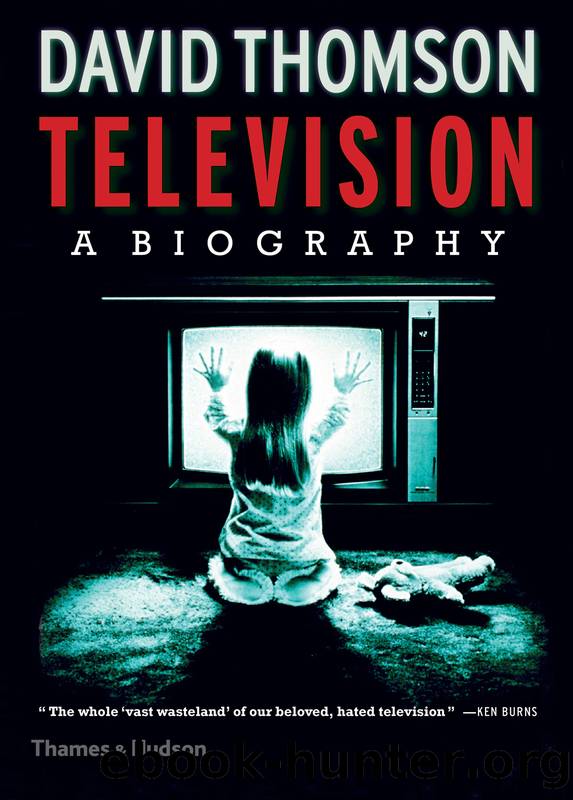Television by David Thomson

Author:David Thomson
Language: eng
Format: epub
Publisher: Thames & Hudson
Published: 2016-06-14T16:00:00+00:00
TIME HAD NEVER PASSED LIKE THIS BEFORE ON TELEVISION.
There was nothing like That Was the Week in America yet, where television was a serene institution, the technological comfort that the BBC hoped to keep possession of. In 1963, the airwaves in the United States were calm or somnolent with Wagon Train, The Beverly Hillbillies, Dr. Kildare, Perry Mason, The Fugitive, and even The Dick Van Dyke Show. In all these programs, and in all the others, a show appeared on time, the way it had been last week; and in the stories wrongs were righted, dysfunctional lives were put straight, production codes were adhered to, and happiness and purchase prevailed. You rode the story arc and you got the message, from Chesterfield, Lux, or Chevrolet, in just the way the surge of patriotic wartime movies had ended with “Buy War Bonds as You Leave This Theater.” You had to search hard for any hint of insurrection in TV, but it was there in a frivolous, playful marvel called Candid Camera (1948 onward), the one show in which the medium winked and said, “You’re not trusting us, are you?” Its host, Allen Funt, was a likeable fellow, a benign real-life Joker, captivated by people and amazement. But provocative questions came from his fun.
Just over a year after the ordeal of the Cuban Missile Crisis, there came the sequel. That started in Dallas with the motorcade. In the assault on the Republic and its assurance, television had its greatest boost and vindication. In fact, the CBS Evening News had gone from fifteen minutes to thirty only two months before Dallas, but now the News went on and on, unbroken and unstoppable. Cronkite and a few others were there all the time, visibly shaken and unshaved, older and so much sadder. Time had never passed like this before on television, and it was the prolonged crisis that had put a camera in the basement of the police station, waiting for Oswald to show. The shootings turned into the funeral, and Cronkite came out of all this in horrible and helpless eminence, because he had been the most constant and reassuring presence. Brinkley was grave and eloquent, but he couldn’t be wry anymore. Cronkite was faithful and stoic, and that was closer to the technological presence of the medium. He was on, and there is a way in which the television has never gone off since then.
So when I said that Brian Williams of “our” NBC seemed to be an able newscaster, I didn’t mean to sound patronizing. I liked him, as far as I could, watching him three or four times a year. I could hear what he said, and feel he’d thought about what he was saying. He covered Katrina admirably, and he did have an interview with Edward Snowden. But Brian Williams never had the opportunity to become iconic or to become the news—until his admission that he had sometimes exaggerated his own presence in news events, like a kid wanting to be in an adventure movie.
Download
This site does not store any files on its server. We only index and link to content provided by other sites. Please contact the content providers to delete copyright contents if any and email us, we'll remove relevant links or contents immediately.
| Classical | Country & Folk |
| Heavy Metal | Jazz |
| Pop | Punk |
| Rap & Hip-Hop | Rhythm & Blues |
| Rock |
Cecilia; Or, Memoirs of an Heiress — Volume 3 by Fanny Burney(30969)
Cecilia; Or, Memoirs of an Heiress — Volume 2 by Fanny Burney(30923)
Fanny Burney by Claire Harman(25812)
We're Going to Need More Wine by Gabrielle Union(18110)
Plagued by Fire by Paul Hendrickson(16657)
Cat's cradle by Kurt Vonnegut(13933)
Bombshells: Glamour Girls of a Lifetime by Sullivan Steve(13142)
All the Missing Girls by Megan Miranda(12814)
Leonardo da Vinci by Walter Isaacson(11953)
4 3 2 1: A Novel by Paul Auster(11101)
Adultolescence by Gabbie Hanna(8164)
The remains of the day by Kazuo Ishiguro(7600)
Note to Self by Connor Franta(7040)
Diary of a Player by Brad Paisley(6878)
Giovanni's Room by James Baldwin(5937)
What Does This Button Do? by Bruce Dickinson(5554)
Recovery by Russell Brand(4587)
Born a Crime by Trevor Noah(4546)
The Kite Runner by Khaled Hosseini(4510)
